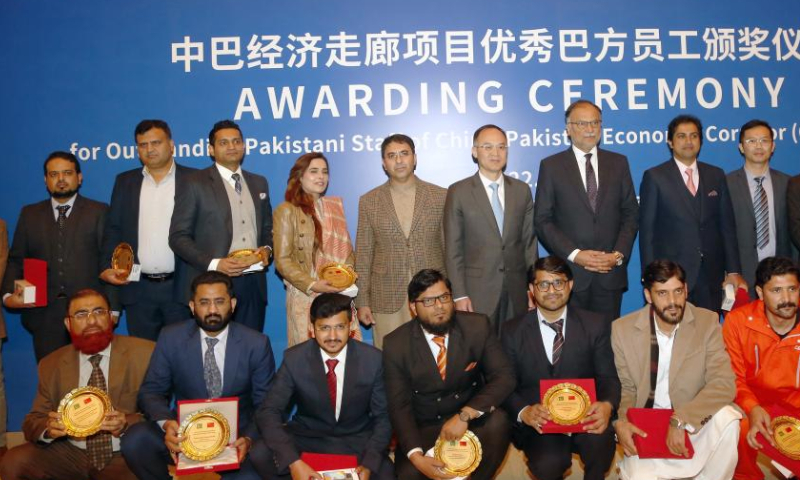
Pakistani Minister for Planning, Development and Special Initiatives Ahsan Iqbal (7th L, Rear) and Chinese Ambassador to Pakistan Nong Rong (6th L, Rear) pose for a group photo with Pakistani staff of the China-Pakistan Economic Corridor (CPEC) project at an awarding ceremony in Islamabad, Pakistan, on Dec. 30, 2022. Iqbal said on Friday that Pakistani and Chinese staff of CPEC project have joined hands to work hard with dedication as a team to make the project a success story. Photo: Xinhua
“I as a Pakistani can say that Pakistan has benefited tremendously from the Belt and Road Initiative (BRI) that China proposed,” said special assistant to the Pakistani Prime Minister and former special envoy for the China Pakistan Economic Corridor (CPEC) Zafar Uddin Mahmood.
He also dismissed the so-called “debt trap” accusation that some politicians and media outlets have hyped, noting that some people dislike China due to ulterior motives.
Mahmood made the comments at a media conference held on Tuesday by Understanding China, GBA Dialogue.
He also pointed out that China has introduced the reforms that were the most suitable for China and that meet the requirements of the Chinese people. The core objective of these reforms was to improve the lives of the Chinese people.
“China, during the last few decades, has proved that its reform and opening-up policy was correct, and it has paid dividends. It has become a successful model for the whole world to follow,” he said.
Mahmood mentioned that based on his own observation, Chinese culture has a very important aspect – the philosophy of sharing. The BRI that China proposed is a continuation of the Chinese cultural tradition of sharing with others, he noted.
According to Mahmood, the past 10 years have proved that China did it with full sincerity and commitment and tried to help countries across the world.
“The most beautiful part of this initiative is that China invites other countries to join and asks them to identify the areas and the projects which they would like to undertake,” he said.
Mahmood worked for the CPEC from the day it was launched. Based on his working experiences with China, he highlighted that China’s support is different from other countries as it doesn’t have any strings attached.
He specially brought up the example of electricity. Pakistan faced a serious shortage of electricity about nine years ago during which they had to cut off electricity for more than 12 hours a day sometimes, even in the big cities.
“So we put our focus on increasing the production of electricity and within a very short period of time and with the help of the Chinese government and Chinese companies we were able to overcome this shortage of electricity,” he said.
Pakistan has also developed its road network in a very short period of time, and now there are expressways running from the north of the country to the south.
“This is how we benefited from the BRI and China's modernization. We are very happy about this cooperation. And this was only possible because of China's economic development and China's desire to share its development with its friends, with its neighbors and with all the developing countries in the world,” he said.
“We can now learn from China’s successful experience of modernization. China has brought 800 million people out of poverty within a very short period of time, which is something that all the developing countries wish to learn from so that they can improve the living standards of their people,” he said.
As for China-Pakistan cooperation, he said that the first phase was more focused on infrastructure development, and now in the second phase more focus will be in other areas like agriculture development and education.
He admitted that there is a lack of understanding about China all over the world. “There is a lack of understanding not only that China improves the living standards of its own people, but also that it has contributed to the global economy. There is a need to understand that Western countries have their own objectives,” he said, noting that this misunderstanding has to be removed through joint effort.




